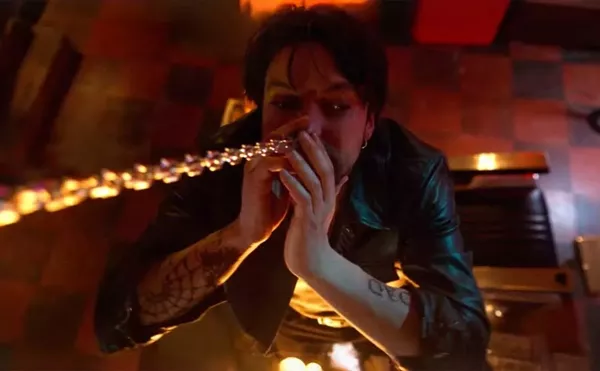
Audio By Carbonatix
[
{
"name": "GPT - Leaderboard - Inline - Content",
"component": "35519556",
"insertPoint": "5th",
"startingPoint": "3",
"requiredCountToDisplay": "3",
"maxInsertions": 100,
"adList": [
{
"adPreset": "LeaderboardInline"
}
]
}
]
The story of a dewy-eyed young woman who's corrupted by the temptations of hedonism in 18th-century France, Manon demands its title character go from a shy ingenue to a vain, worldly woman. When Swenson first comes on stage with a bashful smile, lowered eyes and a girlish voice, she's the epitome of a fragile innocent. But as she ripens into a woman seduced by money and glamour, her behavior becomes haughty and her voice is buoyed by the frothy air of vanity.
Massenet not only requires Manon to be on stage throughout most of the opera, but he also asks for some high-flying vocal fireworks. This role is a piece of work, not a piece of cake. Swenson, a lyric coloratura of beauty and brilliance, is up to the task, zipping up and down the scale and letting loose with some sky-piercing high D's. But as thrilling as the vocal acrobatics are, Swenson's most persuasive moment comes when she sings "Adieu, notre petite table," in which she bids farewell to the happy life she led with her lover, Des Grieux. She infuses the aria with delicacy and tender pity.
Swenson is partnered by a fine Des Grieux, Sicilian tenor Marcello Giordani. Although he sang a trifle sharp in parts of "Ah, fuyez, douce image," he endows the aria with heartbreaking pathos and tonal plushness. Other tenors may sing "En fermant les yeux" with more elegance, but rarely with the sweetness with which Giordani invests it.
Baritone John Robert Autry is appropriately stiff as Manon's ever-vigilant cousin, and bass James Patterson (subbing for indisposed Detroiter Ara Berberian) brings great authority to the small but pivotal role of Des Grieux's father. Baritone Rodney Stenborg is rather too aloof as the wealthy lothario De Bretigny.
Michel Beaulac and Bernard Uzan's imposing sets suggest the bejeweled elegance of a bygone era, although the last scene looks too phony. Uzan is also the director, and except for a few sluggish episodes, he moves the production along swiftly and coaxes dramatic subtleties from the principals. No one is allowed to sleepwalk through this opera.
Conductor John Mauceri must be lauded for his adroit balancing act of underscoring both tenderness and sensuality, which is what Manon is all about. He stretches the tempos a little here and bends the rhythms a little there to great effect. He also cajoles the orchestra to play at a whisper during the table scene and then to gush out in romantic effusion during the love duets.
Lighting designer Kendall Smith deserves plaudits for his sensitive and nuanced work in gently coloring the mood of the production.
Still, this Manon could rightly be called "The Ruth Ann Swenson Show." After all, without a top-flight Manon, you don't have an opera. George Bulanda frequently writes about the arts for the Metro Times. E-mail letters@metrotimes.com





